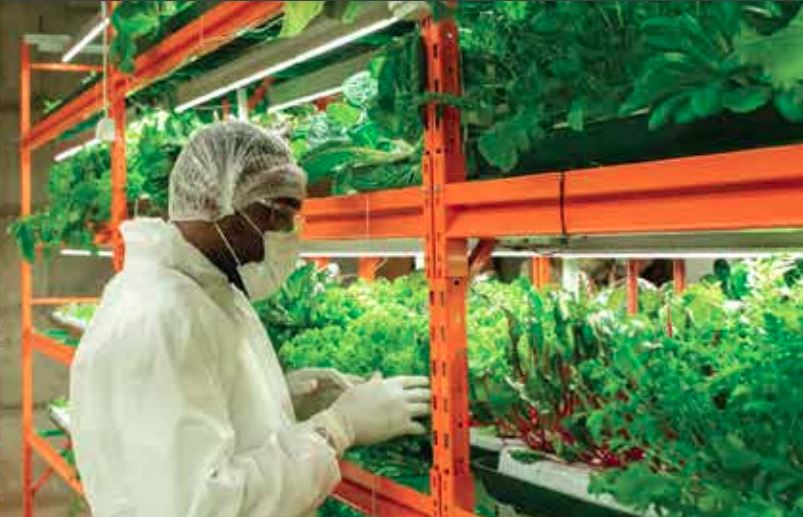As Covid-19 continues to lay bare our vulnerabilities, our food insecurity has become more prominent than ever. Additionally, our position as one of the most food insecure regions on the planet is now being further accentuated by the ongoing disruptions in the global supply chains. This has in turn driven up shipping costs and with it an accompanying increase in the prices for everything we consume including the food on our table. It goes without saying that everyone will be affected, especially our most vulnerable citizens as our economies continue to reel from the onslaught of the coronavirus pandemic.
According to the CARICOM Secretariat, the food import bill for the Caribbean Community stood at US$4.98 billion in 2018 which was more than double our US$2.08 billion food import tab of 2000. The Food and Agriculture Organisation (FAO) has indicated that if current trends continue, similar exponential increases in our food import bill will take place in the coming years. The figures paint a worrisome picture of our current situation. As a Caribbean Community, by and large we import more than 60% of the food we consume, with some countries importing more than 80% of the food they consume. According to the FAO, only Belize, Guyana, and Haiti produce more than 50% of their food consumption.
Given the already high levels of debt, increasing unemployment and more of our people falling into poverty because of the coronavirus pandemic, continued heavy reliance on imported food is simply unsustainable. This external dependence also heightens our vulnerability from a national security standpoint. COVID-19 by now has shown us that globally, countries put their citizens first as we have seen in the case of vaccines. Consequently, laying the foundation for food security must be of the highest priority for us as a Caribbean region.
In this regard, it is good to see that Caribbean governments have set a target to reduce regional food imports in 2025 by 25% – 25 in 5 – and many countries have committed to undertake policy measures and incentives that support food production in our Region. The obvious question is how this can be achieved when the conventional wisdom has been, that save for countries like Belize, Guyana and Suriname, we simply do not have land space to produce on the scale required to make us food secure. However, other countries like Israel have turned conventional wisdom on its head by effectively embracing technology to build food security. We must do the same.
For us in the Caribbean, the introduction of new technologies presents a major opportunity to accelerate food production, create jobs and attract investment. Embracing and accelerating the use of technology in agriculture or AgTech makes sense since it allows us to produce more with less, making food production more efficient.
In agriculture, innovations using technology, such as hydroponics and aquaponics have circumvented the need for extensive cultivable land, which is a major constraint in many of our small territories. The introduction of artificial intelligence, analytics, connected sensors, and other emerging technologies could further increase yields, improve the efficiency of water and other inputs, and build sustainability and resilience across crop cultivation, animal husbandry and agro-processing.
However, with few exceptions, we have been slow to embrace the widescale use of new technology in our food production systems. This is not a challenge solely faced by the Caribbean, as the World Economic Forum has noted that for its member territories, only $14 billion in investments in 1,000 food systems-focused start-ups was generated since 2010, while healthcare attracted $145 billion in investment in 18,000 start-ups during the same time period. However, notwithstanding the challenges, in addition to Israel, countries such as the United Arab Emirates have been paving the way in leveraging technology in agriculture and getting the requisite investments to make it a success.
For us at the Caribbean Export Development Agency, there is a path forward. We have worked with the Caribbean Association of Investment Agencies (CAIPA) to identify AgTech as a priority sector to attract foreign direct investment as well as to stimulate regional capital flows.
Caribbean Export is fully committed to the goal of ‘25 in 5’ and we have begun our work in concert with our partners to define a mechanism to position the region´s AgTech opportunities to regional and international investors. During the Caribbean Week of Agriculture, we are convening the first-ever Caribbean AgTech Investment Summit (5-7 October 2021) headlined by the President of Guyana. Here we will be presenting investment opportunities that are available in the region in the AgTech sector and helping to define a way forward to assist the region in improving its AgTech investment offering. More information on the event can be found at: https://content.carib-export.com/event/caribbean-agtech-investment-summit/
It is important to emphasise that to build food security, the private sector has an essential role and farming must be seen as a business that is attractive for our youth. This is precisely why we will continue supporting producers who are looking to the export market, taking advantage of opportunities such as those provided by the Economic Partnership Agreement with the European Union. This is with specific reference to building the capacities of regional producers to access high value markets such in Europe. Additionally, we remain committed to using our grants programme financed by the European Union to help support our businesses across the Region access these markets. The next call for grants will be in mid-October and businesses including those in the agriculture sector are encouraged to apply. More information can be found at www.carib-export.com
At Caribbean Export, we recognise that whilst these measures are important, an all hands-on-deck approach is required with the appropriate enabling environment in place. This means that national, regional and international partners must work in unison to help drive an agenda for Caribbean food security. We are committed to such a partnership which we believe will also deliver not only food security but also precious jobs and opportunity for our people.
